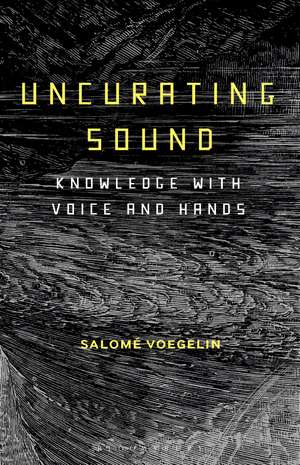Uncurating Sound: Knowledge with Voice and Hands
Autor Dr Salomé Voegelinen Limba Engleză Paperback – 22 feb 2023
| Toate formatele și edițiile | Preț | Express |
|---|---|---|
| Paperback (1) | 129.59 lei 3-5 săpt. | +17.59 lei 7-11 zile |
| Bloomsbury Publishing – 22 feb 2023 | 129.59 lei 3-5 săpt. | +17.59 lei 7-11 zile |
| Hardback (1) | 396.82 lei 6-8 săpt. | |
| Bloomsbury Publishing – 22 feb 2023 | 396.82 lei 6-8 săpt. |
Preț: 129.59 lei
Preț vechi: 142.52 lei
-9% Nou
Puncte Express: 194
Preț estimativ în valută:
24.80€ • 26.01$ • 20.64£
24.80€ • 26.01$ • 20.64£
Carte disponibilă
Livrare economică 11-25 martie
Livrare express 25 februarie-01 martie pentru 27.58 lei
Preluare comenzi: 021 569.72.76
Specificații
ISBN-13: 9781501345401
ISBN-10: 1501345400
Pagini: 136
Dimensiuni: 127 x 197 x 10 mm
Greutate: 0.11 kg
Editura: Bloomsbury Publishing
Colecția Bloomsbury Academic
Locul publicării:New York, United States
ISBN-10: 1501345400
Pagini: 136
Dimensiuni: 127 x 197 x 10 mm
Greutate: 0.11 kg
Editura: Bloomsbury Publishing
Colecția Bloomsbury Academic
Locul publicării:New York, United States
Caracteristici
Focuses on the themes of curation, geography, and the condition of material and immaterial production through the perspective of the sonic world
Notă biografică
Salomé Voegelin is Professor of Sound at the London College of Communication, UAL, and an artist and writer engaged in listening as a socio-political practice of sound. She is the author of Listening to Noise and Silence (2010), Sonic Possible Worlds (2014) and The Political Possibility of Sound (2018), all by Bloomsbury Academic. Her work and writing deal with sound and the world sound makes: its aesthetic, social and political realities that are hidden by the persuasiveness of a visual point of view.
Cuprins
List of figuresAcknowledgementsPrologue: Sounding Gaps in PavementsIntroduction: Taking a breath togetherBreath 1 Curating politics in the gallery spaceBreath 2 The possibility of resistance and the performance of alternativesPerformance score listen across to uncurate knowledgeBreath 3 With voice and handssound it IIIIIIIBreath 4 PostnormalPerforming Walls IX Bibliography List of Works Index
Recenzii
An actual and effectual processual removing of the residues of decades of artistic and intellectual encrustations.
Salomé Voegelin's oeuvre epitomizes sonic dynamism. Her latest work is no different. In Uncurating Sound, Voegelin invites us to listen along as she troubles and blurs static lines between knowledge and curation, writers and bodies, sound and the book, reading and performing. As she converses with works by such figures as Kara Walker, Kathy Acker, Adrian Piper, Kate Carr, Ellen Fullman and Manon de Boer, Voegelin reminds us vitally - especially as we continue to emerge from pandemic isolation and sustained distancing - that we are embodied. And questions like, Who is the "I" and the ear that writes? and For whom do we write and listen? are vital to our collective flourishing. Compelling in its speculation and expansive in its sonic wanderings, Uncurating Sound will interrupt our deep assumptions about sound and knowledge as it calls for us, in all our full embodiment, to listen. Where is your body tuned now?
With detours and fuzzy paths, inhalations and exhalations, rivers and their volumes, Uncurating Sound proposes the decolonial and transversal politics of sound is a matter not only for art institutions and their publics but also for a broader untethering from extractive histories and ways of knowing.
Salomé Voegelin's sensitive handling of sound topics as a post-colonial un-discipline is both observational and treatise-ish, caring and critical, and affirms the complex entanglement of curation, the cannon, the archive, and the body, and proposes a new traversing identity of sound studies. A Tour de Force.
Salomé is able to bring art work and theory into a real dialogue (instead of the art work being subordinated to the theoretical frame), which implies that there's a win-win situation: on the one hand, Salomé invites the reader to encounter a sonic art work by offering an open theoretical frame; on the other hand, the theories are brought to another plane by confronting them with concrete art works that "speak back."
Salomé Voegelin's oeuvre epitomizes sonic dynamism. Her latest work is no different. In Uncurating Sound, Voegelin invites us to listen along as she troubles and blurs static lines between knowledge and curation, writers and bodies, sound and the book, reading and performing. As she converses with works by such figures as Kara Walker, Kathy Acker, Adrian Piper, Kate Carr, Ellen Fullman and Manon de Boer, Voegelin reminds us vitally - especially as we continue to emerge from pandemic isolation and sustained distancing - that we are embodied. And questions like, Who is the "I" and the ear that writes? and For whom do we write and listen? are vital to our collective flourishing. Compelling in its speculation and expansive in its sonic wanderings, Uncurating Sound will interrupt our deep assumptions about sound and knowledge as it calls for us, in all our full embodiment, to listen. Where is your body tuned now?
With detours and fuzzy paths, inhalations and exhalations, rivers and their volumes, Uncurating Sound proposes the decolonial and transversal politics of sound is a matter not only for art institutions and their publics but also for a broader untethering from extractive histories and ways of knowing.
Salomé Voegelin's sensitive handling of sound topics as a post-colonial un-discipline is both observational and treatise-ish, caring and critical, and affirms the complex entanglement of curation, the cannon, the archive, and the body, and proposes a new traversing identity of sound studies. A Tour de Force.
Salomé is able to bring art work and theory into a real dialogue (instead of the art work being subordinated to the theoretical frame), which implies that there's a win-win situation: on the one hand, Salomé invites the reader to encounter a sonic art work by offering an open theoretical frame; on the other hand, the theories are brought to another plane by confronting them with concrete art works that "speak back."
